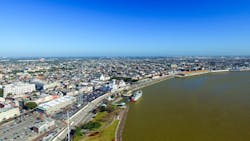Saltwater intrusion prompts emergency for New Orleans, Mississippi River communities
The dry conditions affecting southeast Louisiana have prompted declarations of emergency as saltwater intrusion affects drinking water quality and infrastructure in New Orleans and surrounding parishes.
The intrusion of saltwater will affect communities that rely on the Mississippi River for a steady supply of drinking water. The intake of this water can reduce water treatment capacity, quickly corrode drinking water infrastructure, and introduce health risks for consumers.
New Orleans mayor LaToya Cantrell signed an emergency declaration on Friday, September 22, over concerns around saltwater intrusion. On September 22, President Joe Biden declared a federal emergency in response to a request from Louisiana Governor John Bel Edwards. The emergency declarations will help to mobilize support and response efforts to address drinking water treatment.
In addition, the U.S. Army Corps of Engineers is planning to barge 36 million gallons of fresh water daily to help prevent the impacts of saltwater intrusion, according to CNN.
Dry conditions have lowered freshwater levels for the Mississippi River, leading to the formation of a “saltwater wedge.” This phenomena is being tracked by the U.S. Army Corps of Engineers, allowing communities that draw from the river to anticipate saltwater intrusion. In addition, communities are actively testing their source water for salinity conditions.
The Corps of Engineers also plans to use dredged material to build a barrier on the bottom of the Mississippi River, helping to block saltwater from moving further upstream.
Steve Mathies, Stantec's global practice leader for coastal restoration, believes that sea level rise and more frequent drought conditions can lead to this type of issue occurring elsewhere in the world.
“My greatest fear is that past drought cycles will become more frequent and severe because of climate change and our coastal communities may become uninhabitable due to lack of potable freshwater supplies," said Mathies.
About the Author
Jeremy Wolfe
Jeremy Wolfe is a former Editor for WaterWorld magazine.

